Her Greatest Dramatic Role !
Frank Capra is one of Hollywood’s all-time great directors, but even he has a few lesser known gems in his filmography. Among them is 1932’s Forbidden, a torrid potboiler starring Barbara Stanwyck and Adolphe Menjou. Perhaps even Capra himself thought the film not worthy of much note as he devotes a scant few paragraphs to it in his own autobiography.
But what an overlooked gem Forbidden is! Written and (of course) directed by Capra it’s full of masterful camera shots proliferated with scenic backgrounds and the usual Capra-esque family values. Now granted, as this is definitely a pre-code film, the family values may not be the first thing you remember. And the cast makes what even at the time was a bit of a tired plot (anyone can name at least a half dozen era films featuring a kept woman) a top flight affair.
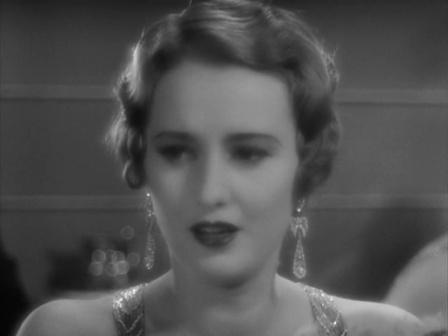 Barbara Stanwyck is Lulu, a rather pedantic and tepid sort of a woman who is a schoolteacher. Ridiculed by her coworkers and openly mocked by the town’s children, in exasperation and perhaps more than a touch of boredom she withdraws her entire life savings and takes a cruise vacation. Though Hawaii is hinted at in the picture, given the fact that she somehow ends up in Havana we’ve got to assume Hawaii didn’t happen.
Barbara Stanwyck is Lulu, a rather pedantic and tepid sort of a woman who is a schoolteacher. Ridiculed by her coworkers and openly mocked by the town’s children, in exasperation and perhaps more than a touch of boredom she withdraws her entire life savings and takes a cruise vacation. Though Hawaii is hinted at in the picture, given the fact that she somehow ends up in Havana we’ve got to assume Hawaii didn’t happen.
After being chastised a bit by the wait staff for dining alone, she returns to her cabin to find Bob Grover passed out on her bed. Bob (Adolphe Menjou) awakes and confesses to being a bit drunk and having confused their respective cabin numbers (66 and 99). Lulu is quickly charmed and returns to the dining room with her new beau on her arm- much to the delight of the wait staff and the house band.
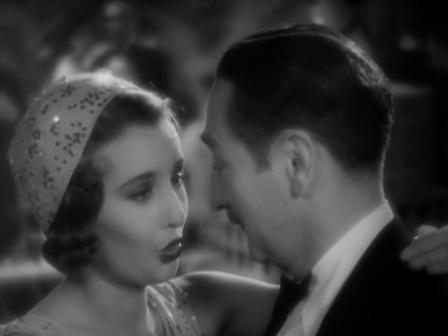 Bob and Lulu hit it off and spend a few days in Havana before returning home where their romance continues. As their love deepens marriage can’t be far behind, but Lulu gets a rather ridiculous and off-handed marriage proposal from one Al Holland (Ralph Bellamy), of her coworkers at The Daily Record, where she works in the records room.
Bob and Lulu hit it off and spend a few days in Havana before returning home where their romance continues. As their love deepens marriage can’t be far behind, but Lulu gets a rather ridiculous and off-handed marriage proposal from one Al Holland (Ralph Bellamy), of her coworkers at The Daily Record, where she works in the records room.
Though Lulu tries to ply Al’s proposal into nudging Bob to make one of his own, he’s got a bigger and less exciting surprise in store for her. In a heated and excellent scene- one of the best of the picture- Bob confesses to the fact that his married to a barren wife. In a rage, Lulu tosses him out almost literally on his heel only to hear him begging for forgiveness.
Bob’s an aspiring politician and already making the fast track up the ladder and needs to avoid a scandal at all costs.
What Lulu doesn’t share is that she’s pregnant with Bob’s baby and as time passes she has the child (a daughter named Roberta) and resumes her affair with him. During one of Lulu and Bob’s outings with Roberta, Holland reappears looking for a story and some dirt on the upwardly mobile Bob. At loss for an explanation, Lulu quickly manufactures that Roberta is Bob’s adopted child and that she’s working for Bob as the child’s governess. Appeased but unconvinced, Holland is satiated for the moment.
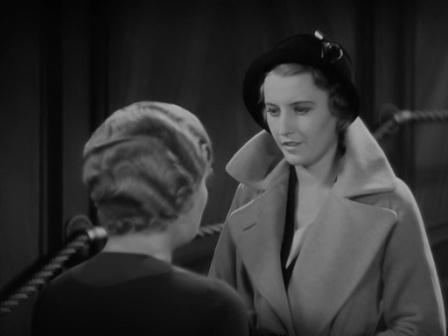 Continuing on with the charade, Lulu actually moves into the Bob’s house and works as the governess for an incredibly short time until Bob’s wife introduces herself. Flabbergasted and unable to control her emotions watching another woman adopt her daughter as her own, Lulu flees and returns to her own apartment and the newspaper.
Continuing on with the charade, Lulu actually moves into the Bob’s house and works as the governess for an incredibly short time until Bob’s wife introduces herself. Flabbergasted and unable to control her emotions watching another woman adopt her daughter as her own, Lulu flees and returns to her own apartment and the newspaper.
Years pass and Lulu watches from afar, following both Bob’s meteoric political rise and Roberta’s maturity through press clippings, creating a scrapbook of the family that could have been. Finally when Bob is running for governor she reaches out to him after seeing him give a speech. They meet again and Bob confesses demonstrably of his hypocrisy and his desire to come clean even if it costs him the upcoming election. They make plans to unite after his announcement but Lulu’s agreement is half-hearted at best: she knows perhaps that Bob’s first love is politics.
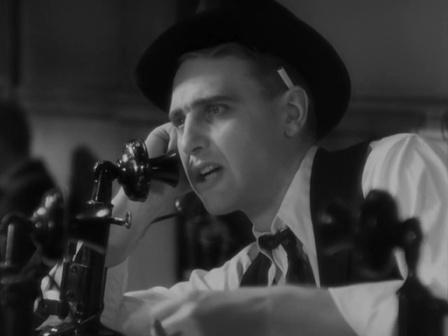 Silently vowing to avert Bob’s revelations to the world and also to divert Holland, who is still out to crush his life-long nemesis Bob, Lulu finally agrees to marry Holland in spite of the fact that she has no love for him. She succeeds at least partially as Bob decides not to expose his affair and the resulting parentage of his ‘adopted’ child. Holland, however, gets nastier, more suspicious and hungrier – he’s almost always eating in the picture. Finally over dinner he confronts Lulu, having been able to confirm at last that she is the mother of Bob’s daughter.
Silently vowing to avert Bob’s revelations to the world and also to divert Holland, who is still out to crush his life-long nemesis Bob, Lulu finally agrees to marry Holland in spite of the fact that she has no love for him. She succeeds at least partially as Bob decides not to expose his affair and the resulting parentage of his ‘adopted’ child. Holland, however, gets nastier, more suspicious and hungrier – he’s almost always eating in the picture. Finally over dinner he confronts Lulu, having been able to confirm at last that she is the mother of Bob’s daughter.
After Holland makes to print the story Lulu stops him and shoots him dead, yet again keeping the secret safe. After a year in prison she’s pardoned by Bob, who is now the direly ill governor. Going to his bedside (while the wifey is yet again in Europe), she finds him near death. Before he passes Bob passes her a note bequeathing half of his estate to her and acknowledging at long last their life on and off together.
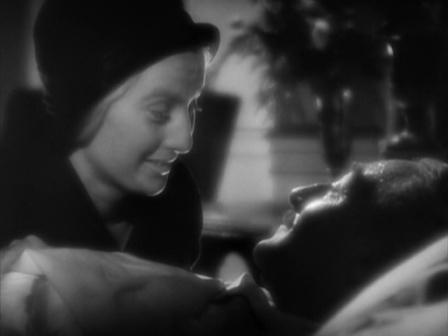 As reporters dash to get the story of Bob’s death to their editors, Lulu slowly walks out and down the street, still clutching the note entitling her to an assured small fortune. In the final scene she crumples it up and throws it away, preserving forever her secret life.
As reporters dash to get the story of Bob’s death to their editors, Lulu slowly walks out and down the street, still clutching the note entitling her to an assured small fortune. In the final scene she crumples it up and throws it away, preserving forever her secret life.
Yes, the story is a bit tired but Barbara Stanwyck and to a slightly lesser extent Adolph Menjou do an outstanding job in their roles. Though perhaps not as meaty as some of her more famous roles, Lulu marks one of the roles which propelled Stanwyck to stardom after a string of mostly weak outings previously. Throughout her struggle she both tears at your heartstrings with her challenges but still makes you smile at her little bits of humor.
Menjou definitely is good as the conflicted if backbone challenged philanderer. Menjou was never known for leading romantic roles, and in spite of a good performance in Forbidden we can see why. Though playing well off of Stanwyck he seems a bit of a damp rag and it’s hard to find what his allure is.
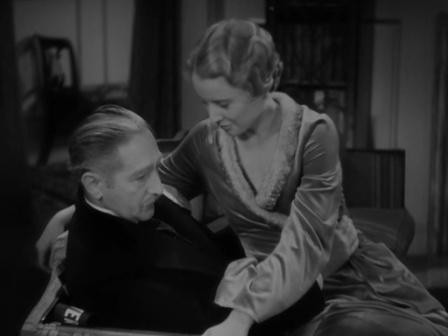 Beautifully shot with some strong exteriors (notably a beachside horseback scene in which Stanwyck famously damaged her tailbone), it is clear that little expense was spared on the production. Though at times subtle and at others egregious, the makeup utilized to demonstrate the casts aging through time is extremely effective without detracting from the proceedings. Some purists will note that though the characters ages over the 30 or so years during which the film takes place that we’re still obviously in 1932 for the whole time. No matter.
Beautifully shot with some strong exteriors (notably a beachside horseback scene in which Stanwyck famously damaged her tailbone), it is clear that little expense was spared on the production. Though at times subtle and at others egregious, the makeup utilized to demonstrate the casts aging through time is extremely effective without detracting from the proceedings. Some purists will note that though the characters ages over the 30 or so years during which the film takes place that we’re still obviously in 1932 for the whole time. No matter.
Forbidden is one of those films which couldn’t have been made even a year or so later once the code came into effect- even an attempted rerelease in 1934 was aborted as a result.
And throughout we have Capra’s gentle but firm touch that perhaps family is more important than anything else, as Lulu repeatedly turns down her own happiness, wealth and fame to support her daughter and lover. This is a theme that Capra would revisit in many of his pictures (though most more remembered today than Forbidden).
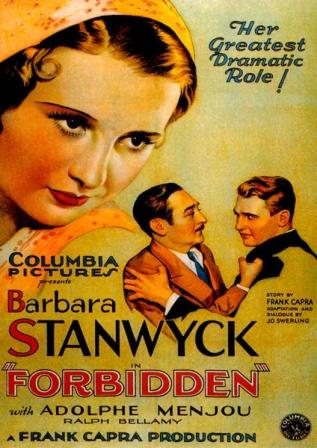
No matter the story, Barbara always makes it her own, and she does so with Forbidden.
The only unbelievable part for me is that, looking the way she did, Lulu could have lasted ten minutes without a dinner partner — unless the journey was a cruise for the blind.
Along with Ever In My Heart, Forbidden is also special to me because I briefly met Ralph Bellamy in the late 80s.
It seems like gals in those pre-code days were always falling for Adolphe Menjou. I guess they like a snappy dresser.
Bellamy as the fast-talking newspaperman shows that he might have been as good as Cary Grant at playing Walter Burns – the part that Menjou played in the original “The Front Page”. My, movies are a small world aren’t they?
I agree that of all the early Stanwyck pictures, this one has always for some reason been a favorite of mine- in spite of not being as well known as some of her others. And I agree that Adolphe Menjou’s appeal is a bit perplexing!